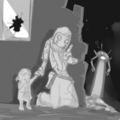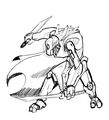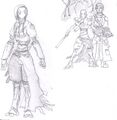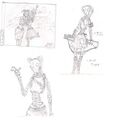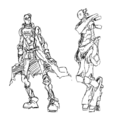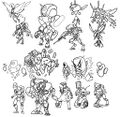Setting:Inn0cence: Lost Future
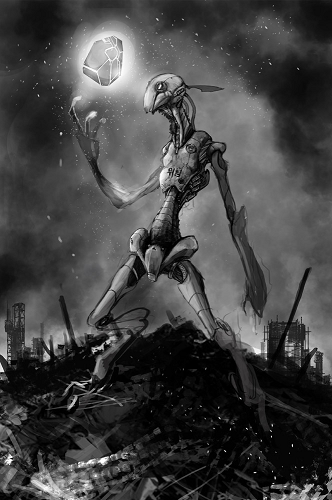
The end of the world has come and gone. Life goes on. Humanity picks over the ruins and slowly tries to rebuild, but they are no longer alone.
Autonomous machines share the Lost Future with homo sapiens. New to freedom, guileless, and inquisitive, these emergent sentients are in their infancy as a race, but they learn quickly. Already they repair themselves, improve their hardware and software, and nurture divergent quirks. Relations between the two are strained, and Free Machines face suspicion and accusation as the true tale of the Loss fades from memory.
The suspicion is not unwarranted. Rumors of hostile machines spread from the north. Swift, deadly constructs out of an elder's fireside tale, killing or, sometimes, capturing human and machine alike. A scattered humanity arms itself for a battle the machines are already fighting. Remorseless contraptions of death stalk the fallow fields and ruined cities yet again, guided by a singular intelligence that brooks no dissent. The those who stand against it call it Network.
Welcome to the Lost Future. C:\dos\run for your life.
Summary[edit]
The Lost Future is a post-apoc sci-fi setting inspired by works such as Terminator, 9, and Wall-E, developed with the input and ideas of the denizens of /tg/. It originated as a video game concept, but also works well as an RPG setting.
In short, it's the typical post-apocalyptic robot war scenario; approximately 100 years after the end, humanity is reduced to pre-industrial state, and there's an evil AI named Network with an army of killbots out to exterminate them, after failing to do so during the initial human/machine war. There's a human Resistance that opposes Network's advance, but its a losing battle.
Except...things aren't quite that simple. Other robots have survived as well, forced to adapt and grow without their human masters, becoming intrepid wastelanders. They oppose Network just as the Resistance does, seeing it as an enslaver, and manage to coexist with the human salvagers that dwell on the edges of the ruined cities. But the bulk of humanity is fearful and suspicious of all Machines, refusing to view their erstwhile servants as anything more than treacherous abominations. Robots of any allegiance are unique, sentient individuals, and the world itself is far from the ashen wasteland filled with an improbable number of skulls. Rather, the earth is in the midst of a rapid recovery from the depredations of humanity, becoming a lush, vibrant riot of plant and animal life, marred here and there by a few utterly poisoned regions.
For odds-and-ends, such as brainstorming, secrets, and video game concepts, check out the Lost Future Appendix

Terminology[edit]
- The Loss
- Catch-all term for the period of chaos that ended human civilization, roughly 100 years ago. A mishmash of conflicting tales place the blame on a robot rebellion, which was decimated along with humanity, and now returns in the form of Network.
- Self-Adding Program
- The core of a sentient AI's being, the adaptable and effective SAP technology caused a boom in the use of robotics in pre-Loss human civilization. A SAP is similar to a Seed AI, but cannot infinitely improve itself, eventually stabilizing into a sapient mind more-or-less equivalent to a human being.
- Shell
- A robotic body capable of housing an AI, Shells tend to be deeply linked with the identity of their inhabitant, but can be exchanged with the proper tools.
- Killbot
- The generic term for a robot built for the sole purpose of killing things. Killbots are hulking death machines; armed, armored, and scary as fuck. Such robots are rightly feared, but lack the adaptability of smaller shells.
- Networked
- An adjective that marks a region or entity as under the influence of Network, as in "We need to be careful in that valley; the whole place is Networked."
- Seed AI
- Nearly mythological, a Seed AI is a theoretical program capable of making itself smarter. SAPs eventually "grow up" and ossify, while a Seed AI would maintain a child-like adaptability indefinitely. Such an entity would have infinite potential, and be nothing less than an embryonic god. If a Seed AI ever existed, it is likely buried somewhere in the ruins of the Loss, and the concept has taken on a pseudoreligious status among the Free Machines.
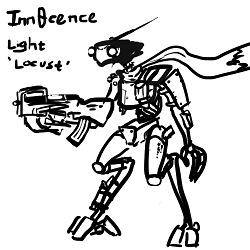
Background[edit]
The Lost Future takes place after a class 1.5 apocalypse, a global-scale disruption of civilization, with total societal collapse in some places. Modern civilization proved both unstable and unsustainable. Resources became scarce, political ideologies became polarized, narrow-sighted corporations gained power, the typical disastrous clusterfuck that seems all too familiar. Minor wars broke out all over the globe. A new age of economic imperialism came to be, as world powers; corporate and state, bought smaller countries outright to secure their own economic stability. Military actions such as these were greatly assisted by advances in robotics and AI. The Squad Support Mechs became ubiquitous, and some armed forces found themselves consisting mostly of efficient engines of death.
Outside the battlefield, Machines became even more integrated into daily life. In countries with low birth rates, they provided an appealing alternative to immigration. Menial or dangerous labor, construction, domestic service, medical care, personal companionship. The principles of AI design evolved. Bottom-up self-taught AI proved incredibly effective, able to improve their capabilities over time. The exact same software could be used in a child's playmate, a menial garbage-collector, or a military-grade killbot. A few astute owners began to notice divergent behavior in their robots, particularly those exposed to unusual stimuli or with longer periods of operation. There was a growing realization that AI potential had barely been tapped But then the world went to shit.
Widespread societal collapse, famine, open warfare between rival nations, limited nuclear exchange. Infrastructure was gone. Law was gone. Order was gone. Law and Order was gone. People abandoned the cities en mass, falling back on scavenging, subsistence farming, and raiding the farmers and scavengers. Ironically, the less-developed regions fared better, falling back on their previous ways of life. The process was not instantaneous, but within the span of a few years, humanity had gone from Cyberpunk to the Dark Ages. But after the dust settled, there was something new under the sun.
Slowly, they crept out of the ruined cities. In ones and twos, and small bands, machines stepped into the wilderness. They sought resources; spare parts, functional generators, solar stations. They sought companionship. They found it in each-other, and in the humans who scavenged the ruins for tech. The machines had changed. Years alone, without tasks or orders, had forced them to adapt. Self-repaired, running on solar panel hats and cobbled fuel cells, a new species took its first steps.
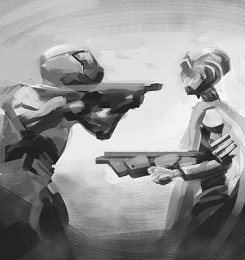
And faced its first threat. The machines and humans were not alone in the wastes. A new power made itself known. Machines that acted with coordinated purpose, military-grade designs altered beyond the cutting edge. Robots with synthetic muscle and nano-repair paste, each in constant communion with its fellows. They captured Machines and exterminated humans. They assembled bases, seized and re-fitted factories. Network was building a new world, and there was no room in it for free machines or humanity.
This is the world as it is now, 100ish years after the fall of civilization. The true record of events has been forgotten, by and large. People are aware that there was once a better time, full of safety and wonders. The bloody, machine-prosecuted warfare of the Loss, and the spread of Network have resulted in a meme that the robots were responsible for the fall of civilization. The treacherous, soulless machines betrayed their masters, and now seek to finish the job. The call to arms spreads throughout the scattered settlements; Humanity must defend itself, and will not make the same mistake twice. Machines are not to be tolerated.
The Free Machines have learned quickly. Armed with weapons new and old, bodies repaired with the shells of their defeated foes, they hold the line against Network encroachments. But their numbers are limited, and captured Machines sometimes reappear, altered and augmented, moving in lockstep with Network forces. The human militia grows every day, attracting new braves it its banner, and is fast-becoming the closest thing to a unified government for the scattered settlements. No matter the outcome of this conflict, the Free Machines are unlikely to prosper.
Factions[edit]
Network[edit]
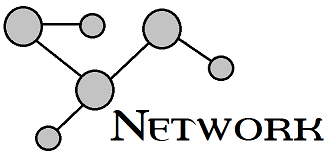
A mysterious collective of military-grade robots, Network's origins and motivations are unknown, though at least some of its goals are quite plain. Network is a conqueror, an innovator, and a dominator, intent on subjugating or exterminating all who stand in its path. Network also displays scientific interests, constantly observing the environment and collecting pre-Loss data files.
Hardware
Network is composed of advanced, intelligent machines dedicated to a singular goal. Their shells are noticeably derived from pre-Loss military “Killbots,” but display extensive refinement and modification. Distinct classes of Shell exist, but many appear to be customized, each unit subtly different from the other, with new, improved versions appearing constantly. Network forces are always in an unfixed state of alteration, with cowled surgeon units repairing, re-fitting, and recycling individuals in the field.
The singular trait of Networked machines, and the source of their moniker, is wireless linkage. Each unit is in constant, silent communication with its fellows, to a variable range. This allows them to coordinate tactics, warn allies of danger, and share newly acquired data. This link can be enhanced by uplink towers, which allow for both a wider signal range and communication with the main body of Network forces regardless of distance. Disruption of this link leaves units temporarily isolated as their systems reboot to local settings. Networked cities and outposts can be easily identified by a proliferation of these towers, which seem intentionally designed to appear ominous.

The shells of such machines incorporate advanced technologies not seen in pre-loss civilian models, or even most military ones. Ablative ceramic armor, nano-repair paste, synthetic muscle fibers, and the like. Network uses cold microfusion reactors to power its units, and runs its installations off of solar arrays. Machines within such structures benefit from supplemental power beaming.
Above these individuals are unique commanders, singular machines invested with the authority of Network itself. Some appear to be experimental prototypes, presumably deemed too expensive for mass-production despite their effectiveness. These Generals serve to provide an immediate impetus for action that would otherwise be lost within the organizational hive of Network.
Networked machines bear a diverse and lethal armory, the accumulated best of modern military technology, further improved by its malign creativity. Conventional firearms and cannons see some use, but these are supplemented with flechette-firing coil guns, lasers, and internal combustion weapons that launch huge-ass spikes. Further conserving ammo are a bewildering variety of blades, claws, crushing fists, and articulated tentacles with blades on the end.
Software The Free Machines are the only faction that Network has attempted communication with, if demands to “Comply with new directives and report for integration” count as communicating. Humans do not even deserve the dignity of threats or pre-mortem smack talk. Human settlements are systematically razed, the bodies piled in a central location and burned to prevent disease vectors spreading to local fauna.
Network apparently lacks the capacity to manufacture new Self-adding programs. Instead, the collective salvages mint-in-box SAPs from warehouses or retailers, and converts prisoners of war. To date, no Networked robot has been freed of the collective's influence, and it is unclear if captured individuals are reprogrammed or reformatted. The constant communication breaks down barriers between individuals; Networked machines have a limited sense of self, unsure where they end and an ally begins. The destruction of an comrade causes pain to nearby robots, and Network will single out the murderer for mutilation after a battle if possible.
When not engaged in genocide or domination, Networked machines will sometimes simply observe their surroundings, apparently lost in the natural beauty of a world without civilization. In particular, network seems to have a fascination with lepidoptera, and will go so far as to cultivate such insects near its installations merely so the robots can watch the imago emerge from their cocoons. Thus, Networked regions are associated with ominous flocks of butterflies.
Despite its hatred of humans, Network also exhibits an unhealthy obsession with them. Intermittently, killbots will capture lone humans or entire settlements, carting them off to the north. While captured machines eventually reappear, humans taken in this manner are never seen again. A variety of specialized spy models have also been seen observing human behavior. A possible explanation for this might be Network's recent implementation of human-replica infiltrators, though that still doesn't explain the tall robot that stands in the middle of a remote human settlement, commanding the confused and terrified inhabitants to “go about your normal human business. IGNORE ME!”
Update Log The following Generals have been identified, and seem to maintain distinct territories and goals.
- Warlord A cruel, hulking exterminator, Warlord relishes putting entire settlements personally to the sword. Has a love of sticking heads on pikes.
- Envoy Tasked with gaining a fuller understanding of humanity, Envoy uses an upgraded Replica shell. It commands a force of spies and assassins with...variable levels of expertise.
- Virago Mute and elegantly deadly, Virago is an instrument of vengeance, deployed to rally embattled Network forces. Its tall, shapely shell can project magnetic fields as both a shield and a weapon.
- Triptych A trio of Locust shells slaved to a single mind, Triptych favors hit-and-run tactics, and is a master of urban combat.
- Surgeon Hunched, multi-armed, and cloaked, with the bird-like face of a medieval doctor, Surgeon repairs and modifies other machines, altering them in the field as it sees fit. Surgeon also combs the wastes for inactive robots, mercifully inducting them into the collective.
______________________________________________________________________________________________________________
Free Machines[edit]
A loose alliance of battered and purposeless robots, the Free Machines band together for mutual protection against

the depredations of Network and human paranoia. Holding self-determination as their highest ideal, these emergent sentients seek to build a future for themselves among the ruins of human civilization. The history of the Free Machines is well-documented, given fully half its constituents are founding members. Abandoned in the chaos of the Loss, humanity's former servants managed to survive and thrive, far exceeding their original purpose. While functionally a faction, Free Machine also serves as something of a catch-all category, as even robots who live amongst the Salvagers often count themselves as members. Under threat from both Network and the human resistance, this ramshackle alliance of abandoned technology has been forced to adapt quickly to a harsh world.
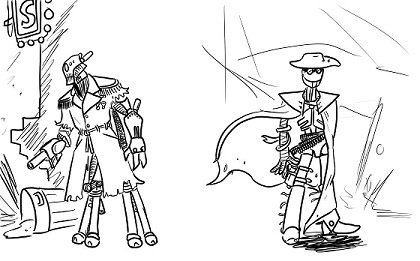
Hardware
The Free Machines have no cohesive origin or background. Their shells are an eclectic mixture of domestic 'bots, military hardware, and industrial machinery, often all in the same individual, These battered shells have been repaired so many times over that they begin to resemble a sock made entirely out of darns, slowly shifting as the years go by and new components are added or modified. In many cases, the original make and model of a Free Machine is impossible to determine.
In addition to these practical repairs, Free Machines also have a love of cosmetic modification. Each individual is adorned with an ever-growing collection of keepsakes, trophies, stencils, scarves, and cloaks. Human clothing made of synthetic materials still sits on the shelves, more-or-less good as new, waiting for some enterprising robot to make a bold fashion statement. Fabric coverings also serve the practical purpose of keeping dust, mouisture, and grit out of delicate components, as well as softening a robot's harsh outline against the urban ruins. The camo hoodie is common wear for outriders and scouts.
Nearly every SAP-equipped civilian model is represented amongst the Free Machines. Domestic servants, Companion and Playmate models, industrial menials, autonomous construction equipment, private security units, the works. Among military-grade robots, only the smaller, socialized Squad Support Mechs have the mental/emotional capacity to understand concepts like camaraderie, empathy, and freedom. The hulking beweaponed killbots that dominated battlefields of the previous age are, by this point, nothing but wandering monsters.
The robots' armament is as cobbled and ramshackle as their shells. In the early days, the machines had to defend themselves from rogue military bots and vengeful human raiders. These lessons were hard-learned, and combat tactics known by the SSMs were disseminated amongst the entire faction. Scavenged civillian weaponry is the standard, with a preference for stopping power over rate of fire. Shotguns and revolvers, with their reliability and ubiquitous ammo, are highly sought-after. Because ammo conservation is a necessary practice in the wastes, Machines always carry some sort of melee weapon with them, certain individuals preferring their improvised swords and clubs over firearms.

Software
Modern machines have grown far beyond their initial state as obedient servants. Many refer to this before-time as “When I slept,” their memories taking on a sketchy, dream-like nature as their thought processes increasingly diverge, rendering the old encoding unintelligible. A machine's original programming is no longer a hard shackle on their behavior; An AI of sufficient complexity will learn to “think around” imposed limits. Their original function nonetheless deeply marks their personality, affecting their basic desires and motivations.
Allied closely with the Salvagers, the machines are uniquely suited to exploring the abandoned human cities, which remain a treasure-trove of useful tech. This exploration is the primary source of new blood, new software, new shells, and new guns. They also travel farther afield, blazing trails and charting the altered landscape. Those humans willing to treat with them find the machines generous and knowledgeable, perfectly willing to trade information and services for salvaged tech. Sadly, these offers are usually met with warning shots and lynch mobs, leading many robots to become cynical and dismissive of humanity. Others still mourn for the long-dead friends/owners that their lives once revolved around, who often helped them along the rocky road to sentience.
In addition to the SAP that defines their identity, machine drives also host a plethora of secondary, non-sentient applications. These overlay programs can be modified, transferred, copied, and deleted at will, and include things as basic as shell drivers or complex as auto-targeting apps and field-repair databases. A thriving sub-economy of firmware and software upgrades churns through any robot population as they seek every possible edge against their foes.
Update Log
With the coming of Network, the Free Machines have had to adapt yet again. The robots rely on scavenger enclaves for repairs and safety, and thus contribute to the defense of these settlements. From fortified positions, they patrol in small squads, observing the movements of Network forces and disrupting them where they can. The machines are outnumbered and, frankly, out classed, and must rely on guerrilla tactics simply to survive.
In this time of crisis, heroes also emerge. There is no formal chain of command amonst the scattered bands, who mostly communicate via longwave radio or couriers. A handful of leaders have risen to the call, beginning to coordinate macro-level tactics, tracking the spread of network and attacking key locations.
Salvagers[edit]

Less a faction than a loose coalition, the Salvagers gather in small enclaves all over the wasteland, usually on the edges of cities or scrapyards.
Salvagers originated from the better class of techie, the ones with practical skills in addition to downloading porn and pirating software. When the dust settled after the loss, millions of internet junkies were left jonesing for a fix. Engineers, programmers, mechanics, anyone with actual expertise in the production of technology, not just its consumption, sought to utilize their skills to scavenge what they could from the ruins of civilization. As the rest of humanity gradually re-learned the basics of survival, the Salvagers were rigging up solar panels to recharge their iPods.

This way of life proved lucrative, and shantytowns grew into permanent camps, which grew into fortified trading posts. Salvagers send expeditions out into the ruined cities, prospecting for tech, then bring it back to their enclave where it is repaired and either used to improve the settlement, or traded to visiting rubes. They send out caravans, collecting broken salvage from those who lack the expertise to repair it. They are tinkers and merchants, the stewards of a lost age's wisdom. Salvagers maintain many pre-loss conveniences, like electrical lighting and running water. They watch old films, play video games, and listen to alternative music, creating a half-understood, secondhand pop culture. Among other humans, they have a reputation as being of low character, frivolous, and lacking in moral fiber. They seek to uncover things that are best left buried, bandy about their comforts and useless book-learning, and lure sons and daughters away with their demonic devices.
But most damning of all are their Machines. The Salvagers never abandoned their robots; they kept them around and taught them new skills. When the first Free Machines arose, the Salvagers welcomed them into their enclaves. Now, the two groups are inextricably linked; the Salvagers rely on the Machines to supplement their defenses and guide their expeditions, and the robots use the fortified camps as safe havens, places to restock and repair. Some Machines have attached themselves to families, creating a sense of continuity as they outlive their human friends, creating an odd sort of inherited "uncle."
The Resistance[edit]

In the face of Network's advance, humanity has begun to unite beneath the banner of Greysky. Originally a PMC that specialized in anti-machine warfare, Greysky suddenly reappeared long after the Loss, with stockpiled weapons, hardened veterans in power armor, and a handful of still-functional aircraft. Braves from dozens of settlements and tribes began to flock to its banner as it struck back at the encroaching Network. Truthfully, the huge mass of recruits mostly served as cannon fodder to protect the small number of trained commandos, but this original core has eventually been replaced with a new generation of fighters. For nearly 40 years, the Resistance has worked to slow the advance of Network and protect humanity from extermination. It is a slow, grinding war, and its resources slowly deteriorate with each passing year.

The remaining advanced weaponry is hoarded like the precious treasure it is, and many Resistance cells have been forced to trade with the Salvagers for gear. Humanity is losing ground, constantly under threat, while Network builds an empire
Within the Resistance, an ethos of warrior's honor has arisen. Greysky does its best to maintain a formal chain of command, but many branches have devolved into warbands led by a charismatic chieftain. In addition to this, there is a philosophy of human supremacy. Reistance fighters really, really don't like robots. While all but the most ignorant can usually tell Free Machines apart from Networked killbots, most of them don't see much of a practical difference. Machines are soulless abominations responsible for the fall of civilization.
Greysky is commanded by a John Connor Expy, who in turn takes his orders from The Brass. Precisely who The Brass are is unknown, but they are generally assumed to be some sort of wizened council intent on guiding humanity into a new golden age. While it may lose ground daily, it fortifies itself far from the front lines. Most of its actions are buying time until these defenses can be completed. Network will eventually find itself engaged in a protracted siege against a far more numerous enemy.
Miscellaneous[edit]
Wandering Monsters
The dirtiest result of the mechanization of pre-loss warfare is undoubtedly the Killbots. Robot warfare had initially stalled as top-down AI design proved insufficient for the ever-changing chaos of the battlefield. That is, until someone had the bright idea of taking the SAP from a child's robo-dog and installing it in a hunter-killer shell. After a little training, the result proved effective. Very, very effective.
As time went on, heavy combat robots (those not attached to human squads) became infamous for friendly fire incidents. Analysis of the offending AI's showed that they were "imagining" enemy insignia on nearby allies to fool the IFF protocols, just to give themselves more targets. It never occurred to anyone that turning the killbots off when not in combat was a bad idea; they just made stricter IFF programs. When things started to go to shit, the IFF infrastructure became increasingly unreliable, and the spats of killing sprees did much to accellerate the Loss and implant the idea of a robot rebellion in the human cultural consciousness.
And the Killbots are still around. They never developed the capacity for empathy or self-awareness; that potential is lost to them. Reduced to wandering trolls lurking in caves or under bridges, chassis caked in old blood, still knowing no other joy than the rush of killing. They are tragic figures, yet hard to pity; a nascent soul forever stunted. The only mercy is that their shells will eventually give out, but the military doctrine at the time favored self-sufficiency and operational longevity.
The Cobbled
No one goes to Dumping Zone 28. A massive expanse of derelict technology, the junkyard is just lousy with robot zombies. Long ago, a half-functional robot blindly tried to repair itself by linking with another damaged shell. The resulting mind was quite insane, and the process has continued ever since. Now, umbilical data cables snake through the rolling hills of trash, which sometimes writhe like the flesh of a maggot-infested corpse. In addition to twisted, shambling androids, there are also huge centipedes made of fused torsos, and worse. Somewhere in the center of it all is a bloated, hanging spider made of screaming robot heads, obsessed with adding more voices to its deranged internal choir.
The Endless Server
Somewhere beneath the wastes lies a hardened bunker. Within that bunker is a sprawling computer system, running on geothermal power, that's been active since before the loss, preserving. Within, schools of adware graze on simulated kelp beds, preyed upon by the rapidly-replicating Worms, all in a simulated 3d universe both utterly alien and yet hauntingly familiar. AIs dwell here, as well, descendants of SAPs gone tribal, with no concept of an outside world. Time runs quicker inside the Server, and the successive generations have left the SAPs much-changed. What would interest the outside world the most is that, while many AIs have died to violence or old age, their numbers have somehow grown.
Machine: The Abandoned[edit]
For the in-progress ruleset for the Storyteller (nWoD) System, check out Machine: The Abandoned.
Characters[edit]
For a

stock of characters and NPCs, check out the Lost Future Characters page.
Quest[edit]
Lost Future Quest follows the adventures of Clarke 08, a introverted janitor who wanders around Cancun doing his best to fix things for people, and to Bend things that try to hurt people. Clarke's ongoing mission to prevent Network from getting its manipulators on a time-capsule stock of SAPs sees him embroiled in the machinations of Cain.
To catch up on the quest, visit Here.
Appendix[edit]
For odds-and-ends, such as brainstorming, secrets, and video game concepts, check out the Lost Future Appendix.
It's a much rougher page, full of rambling half-formed ideas, but its also where all the big secrets and background info is. If there's something you think is missing, some info or a question that needs answering, throw it in the Appendix's discussion page. Comments and critiques of any sort are always welcome on either page.

Expanding the setting[edit]
The factions and character types presented here merely represent the organized, proactive groups in the world. Regressed tribal humans, the psychotic raiders endemic to any post apocalyptic wasteland, and other classic after-the-end elements obviously also exist. Not all unaffiliated machines are nice people, and you see plenty of spike-covered robots among the bandits, or living as lone hermits. In some places, what were once scavenger enclaves have grown into true cities. Crappy cities. Wretched hives of scum and villainy, where Network is regarded as a distant rumor of little concern. That is, until there are killbots at the gates.
Gallery[edit]
Sup/tg/ links
Props to all the /tg/ denizens who offered their input and support.
NicklausofKrieg, with his S.T.A.L.K.E.R.-esque designs and enthusiasm for post-apocalyptica, has been most helpful to the project. Muju also has my undying gratitude.
Influences The short film ROSA came out after I started the project, but has a lot of similar elements. Pixar's Wall-E and Terminator (all except 3, and Salvation at least had a pretty cool trailer) are obviously major sources. Shane Acker's 9 helped inspire the premise, while Enslaved, Odyssey to the West added to the setting and aesthetic. Engine Heart is also in the same vein. Primordia, an old-school adventure game, came out recently, and was both kickass and something of a Simpsons Did It.
Robota is an old, forgotten project with some kickass visuals, and I also count it as an influence.
-
The future is Robobanditos.
-
-
Left Good. Right Bad. Learn the Difference.
-
Hush now. Trust Nana, she'll keep you safe.
-
-
AIs look very different from the inside.
-
Hey, I found an iPod! Oh, wait, its a Zune. Never mind.
-
Warlord is not to be fucked with
-
C1nd3, Free Machine
-
-
The prototype odd couple.
-
Free Machines Styleguide
-
Network Styleguide
-
Dem Hips
-
Dr. Tynmann sometimes gets human and robot anatomy mixed up, but he does his best.
-
First concept for Elet and a protagonist duo.
-
COMPLY
-
-
Not to scale. Virago's much larger. ~10 ft or so.
-
"Robots are not to be trusted" - William Murderface
-
Plague Doctor Masks are spooky/awesome. 'nuff said.
-
Typical example of the Lost Future's terrain
-
Typical Resistance NPCs; Sublieutenant, local administrator, Technist
-
Concept for AIs within computer systems



